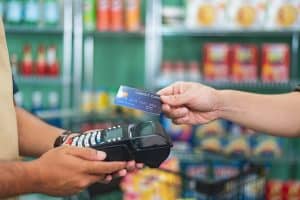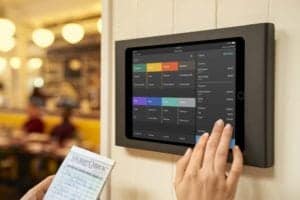We break down POS hardware and software costs and provider specialties by industry so you can easily determine which system is right for your business.
Our content reflects the editorial opinions of our experts. While our site makes money through
referral partnerships, we only partner with companies that meet our standards for quality, as outlined in our independent
rating and scoring system.
Point of sale system pricing depends on the software, hardware, payment processing, and transaction fees the payment processor charges.
In this article, we’ll discuss the basic factors that impact the price of a POS system. If you want specific numbers from vendors, recommendations, and comparisons, discover the best POS systems for small businesses.
How Much Is POS Software & Hardware?
| POS Feature |
Pricing |
| Overall software |
$0-$300+ per month |
| Card reader |
$49-$59 |
| Mobile card processor |
$199-$299 |
| Standalone system |
$799-$3000+ |
| Kitchen Display System |
$600-$1500 |
| Loyalty program |
$0-$49/month |
| Payment processing |
1.9%-3.5% + $0.00-$0.35 per transaction |
| Receipt printers |
$180-$800 |
| Scanners |
$125-$250 |
Generally speaking, you can expect a point of sale system to cost anywhere from $0 to $300, but obviously, so much depends on what kind of features and add-ons your business might need.
There are a handful of great free POS options that do give you at least the basics in terms of inventory management and reporting, and there are all-in-one systems that give you access to extremely advanced tools and include useful features that you may otherwise be purchasing a la carte.
When it comes to POS hardware, the price can also differ dramatically depending on what you will be using it for. A simple chip reader, for example, will only set you back about $50. It will allow you to take card payments but not much else.
There are also mobile credit card readers that come with some basic POS tools and allow you to process payments tableside if you own a restaurant. These will generally start at around $300. And, if you’re looking for a countertop system that is an all-in-one POS system, they can run from $800 all the way up to $3000.
Most companies will also offer payment plans and leasing options, but we would recommend avoiding leases as much as humanly possible. (See our section below on avoiding fees to discover why.)
Extra features like loyalty programs, marketing, or pre-built online stores can add to your monthly expenses.
Factors That Affect POS System Pricing
Here are some of the things that will impact your annual or monthly cost.
- The number of registers or POS devices you have
- If you have more than one physical location
- eCommerce, online ordering, or BOPIS features
- The number of employees you need to manage
- Any industry-specific need that ends up being a paid add-on or third-party integration
- Customer loyalty programs/Customer Relationship Management (CRM) software
- Tools like SMS, email, and/or social media marketing
POS Software Price
POS system software costs $0 to $300 per month or more, depending on the number of software licenses and software features you need. If you need something more than just the basics and have the budget for a paid plan, you can generally get access to features you need starting at around $70 with the ability to either scale up to additional plans or purchase add-ons.
Smaller companies can use a free POS system like Square, while larger businesses usually get custom pricing. You may pay monthly fees for third-party software integrations, too.
POS Transaction Fees
Credit card processing rates range from 1.5%-3.5% plus a flat fee per transaction. Keep in mind that fees for card-not-present and virtual terminal payments are higher because of the added risk for the processor. Smaller businesses should consider flat-rate payment processing. Businesses with a lot of small transactions or large average transaction volumes should consider interchange-plus processing for the best fee rates.
Our article on POS transaction fees breaks down the ins and outs of these sometimes complicated additional costs.
POS Hardware Price
POS hardware costs $49-$1,000 for registers and card readers. Check out our guide to figure out what POS hardware you really need.
If you don’t want to purchase a separate piece of POS equipment, you can opt for a mobile POS system that allows you to take payments with your smartphone.
That being said, there are more hardware options for small business owners than ever before. Multiple companies, like Square, Clover, Toast, and Shopify, all have their own handheld devices that can help you take payments from just about anywhere and they also won’t break the bank, generally starting at around $200.
If you’re looking for larger, full-service countertop devices, like Square Register or Clover Station, they can range from around $800 up to $1500. Payment plans are generally available through most companies as well, along with basic support for setup.
Add-ons like barcode scanners, a Kitchen Display System (KDS), and receipt printers will increase your hardware costs. Some POS providers offer curated hardware kits for different industries or new businesses to keep these costs down.
Avoid Fees By Steering Clear Of Leasing Agreements
Financing your equipment or getting a small loan to purchase your equipment is a better option in the long run. This is because you may end up paying higher monthly fees and higher interest rates if you lease your equipment.
Plus, with leasing, you don’t own your hardware. If you finance your equipment or get a small loan, you’ll own your POS hardware by the time you pay off your equipment.
These are the best small business loans and the best equipment financing companies to help you buy your POS hardware outright without relying on a lease.
 Erica has been writing about small business finance and technology since 2008. She joined Merchant Maverick in 2018 and specializes in researching and reviewing business software, financial products, and other topics to help small businesses manage and grow their operations. Her expertise has been cited in MSN, Reader's Digest, Vox, U.S. News & World Report, and Real Simple. She is a Certified ProAdvisor for QuickBooks Online and QuickBooks Payroll, a graduate of Limestone University, and currently resides in Greenville, South Carolina.
Erica has been writing about small business finance and technology since 2008. She joined Merchant Maverick in 2018 and specializes in researching and reviewing business software, financial products, and other topics to help small businesses manage and grow their operations. Her expertise has been cited in MSN, Reader's Digest, Vox, U.S. News & World Report, and Real Simple. She is a Certified ProAdvisor for QuickBooks Online and QuickBooks Payroll, a graduate of Limestone University, and currently resides in Greenville, South Carolina.A POS system can help reduce operational costs in several ways, from reducing labor costs with self-service kiosks and employee scheduling tools to avoiding the waste of perishable items or overstock with inventory management. Your POS can also streamline operations (and cut costs) by integrating with other business software.
Final Thoughts On POS System Cost
Your POS system costs will vary depending on what your business needs now and what it will need as it scales up. If you have very little money to invest upfront, though, consider one of our picks for the best free POS systems.
To keep costs down, we recommend finding a POS system provider that offers several subscription plans and allows businesses to scale or a provider that offers one plan with all its features available.
Take advantage of all the free software trials available, test out the customer service, get feedback from employees who will be using the POS every day, and always be sure to read any merchant contracts before signing.












